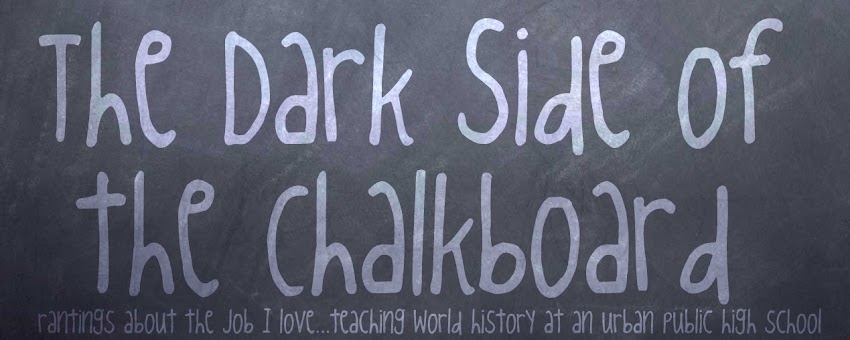One of the things that I get frustrated with in my classroom are the future plans of my kids. It is not unusual for an elementary school kid to want to be a doctor or a lawyer or a basketball player when they grow up, but by the time they are 16, two years from being launched into the adult world, they should have a more reasonable expectation for their future, or at least have a more specific plan for how to get what they want. The majority of my kids are still planning on being a professional sports player or a professional entertainer (singer, model, and actor, in that order), but there are generally between 20-25% of my kids that fail my class, with another 20-25% that end the class with Ds or low Cs.
Last year, towards the end of the year, I overheard one of my lower-level special education students talking about her future plans to another student. She said, "Well, I haven't decided what I am going to do yet, but I will either be a doctor or a lawyer." This student had a 12% in my class and at the end of her sophomore year in high school, only had 2 credits...meaning that she had passed only two classes in two years of high school. So how is it that she is still planning to be a doctor or a lawyer, two careers that are completely out of the realm of possibility for her?
I have thought about this question a lot and while the answer is complex, I think it starts with the limitations of the English language. American kids are told, from day one, that they "can do anything you want to do." What we mean by that is that they have the RIGHT to do anything they want to do. What they interpret that as is that they have the ABILITY to do anything they want to do, and that is where the delusion begins.
Then comes reality tv. Using the premise on every reality show, the only thing you need to do in order to be famous (and therefore rich and successful) is to be obnoxious. There is no real (or perceived) work or skill that goes into these shows, and kids are once again getting the message that you don't need any foresight or plan in order to be successful in life.
Add to that the political incorrectness associated with "tracking" in a high school, and the sheer idiocy of NCLB, and suddenly all kids are being forced to the lowest possible level, instead of being in an environment that reflects the real world, where some people work hard and are successful, some people work hard and struggle, and a tiny fraction of a percentage are lucky and win the lottery. Over the last 20 years, we have created a situation where everything in their environment has told our kids that hard work is not part of the equation of their lives and success comes to those who wish for it. I recognize the validity of the argument that some kids don't find their feet right away and tracking can be harmful for those late-bloomers. But I also think that the fact that we don't have any kind of job training or vocational skills traning for kids who don't have the aptitude for college is a gaping chasm in our educational system.
Do you know that the only vocational or job training available to most high school students comes from joining the military after high school (or being in self-contained special needs classes)? And that manual, or "unskilled" labor has the highest amount of demand for jobs in the US today? But that is another issue altogether....
I think that the first step in changing how kids plan for their future is changing our language. Having the RIGHT to do what they want to do is so very different than having the ABILITY to do what they want to do, but the word "CAN" is confusing because it means both. We have stopped clarifying this difference, and it has been detrimental to our kids.
Finding that thin line between encouraging kids to work hard to get what they want and breaking the news to them that they need to consider other options is a hard line to walk, but I think it is necessary for our kids sake that we suck it up and just do it.

2 comments:
I do have to argue though that if when I was in high school I was tracked directly into vocational training or the like I'd be a very different person from today.
When I was in high school, my parents and I were told by my guidance/career counselor that I had no aptitude for school and would never make it in uni. Was he right? I believed him. Then after a couple of year I woke up. I now have two undergrad degrees (B.A. and B.Ed) and am working on my masters.
And that right there is why it is so important to look at each kid individually instead as a homogeneous blob like NCLB does. I think there are problems with tracking, but I also think there are major problems with assuming that all kids are heading for an MBA. I'm glad that in your case, it worked.
Post a Comment